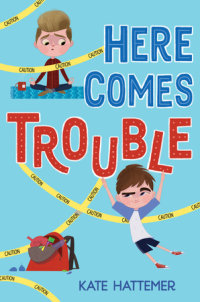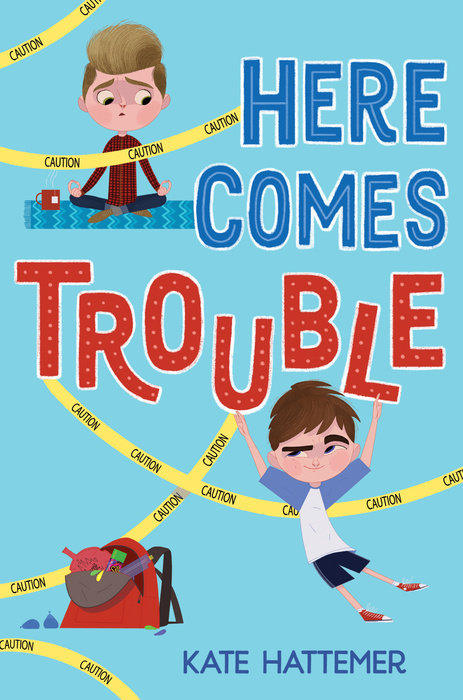Here Comes Trouble
The hilarious story of a wannabe-reformed-prankster perfect for readers who loved Dead End in Norvelt and Better Nate Than Never.
Soren Skaar is a notorious prankster. After his partner-in-pranking-crime moves away, Soren's ready to leave his life of causing trouble behind. But when his hipster Brooklynite cousin comes to "study abroad" with his family in small-town Minnesota, Soren's plans for reform fall by the wayside.
Soon all Soren can see are opportunities to prank, and his shenanigans have done nothing to win over his cousin. It isn't long before he's in over his head, and Soren can't help but wonder who he'll be if he loses this part of himself. Can he give up his life as a jokester, or is the joke on him?
"Give this to fans of the "Wimpy Kid" series who are looking for longer novels."--SLJ
"A fast, engaging read."--Booklist
An Excerpt fromHere Comes Trouble
Our mission: to see out the window without anyone seeing us.
Difficult, sure, given the whole windows-made-of-glass thing. But Ruth and I have had a lot of experience with spy work, and we instantly saw the potential in the long white curtains. She swaddled herself in one and I took the other. We couldn’t move, and we couldn’t retaliate when our brother, Ivan, who’s two and terrible, hit us with his Barbie. But we would get the first look at any car coming down our street.
“They better get here soon,” said Ruth. “I feel like a mummy.”
“Mummies can’t feel,” I told her. Ruth is only in fourth grade, and sometimes her lack of education shows. As her big brother, I feel it’s my duty to enlighten her. “Their brains have been siphoned out--ah-choo!”
“Don’t tell Dad how dusty these curtains are,” said Ruth. “He’ll make us vacuum.”
“Ah-choo!” I wiped my nose on the fabric. “What if I’m sneezing and I miss the car? I’m keeping my eyes open next time.”
“No! Soren! No!” The white column that was Ruth swayed in panic. “If you keep your eyes open when you sneeze, they explode out of your head.”
“No way.”
“I read it in a book.”
“I don’t believe it.”
“Fine,” said Ruth. “Try. See if I care.” She stared dourly out the window. “See if I’ll pick up your bloody eyes from the floor. See if I’ll put them on ice while we wait for the ambulance. See if--”
“Okay! Okay! I’ll--ah-ah-ah-choo!”
I’d closed my eyes.
“Thank you,” said Ruth.
It wasn’t fun, being burrito-wrapped in a curtain that was rapidly coming to resemble the inside of a tissue, but I needed to get a look at Flynn before he got a look at me. A newcomer is big news when you live in a tiny town. And I mean tiny: there’s not a single person in Camelot who doesn’t know me, my parents, and how old I was when I last wet the bed.
(Too old.)
You see, Flynn’s mom, our aunt Linnea, is an artist. She won a prize where she gets to study in Paris for a year, and she doesn’t have to work in a restaurant, too, the way she does in New York. It was a big deal. Probably a bigger deal, though, was that our cousin Flynn was coming to live with us for the entire school year. It was the most exciting thing to happen in Camelot since Mr. Flick’s pig made it to the Sweet Sixteen of the Northern Minnesota Hog Farmers N‑C‑Double-Oink March Madness Tournament.
“My new best friend is about to get here,” I said to Ruth, “and I don’t even know what he looks like.”
Flynn and I hadn’t seen each other since we were Ivan’s age, nine years ago. I had no memories of the visit, but Mom sure did. “You didn’t get along,” she’d said. “You had entirely different senses of fun.”
“What do you mean?”
“Flynn was calm. He would sit in a corner and page through books, even though he couldn’t read. His favorite toy was a child-sized yoga mat.”
“He did yoga?”
“He’d be in downward dog,” said Mom, “and you’d be sprinting circles around him, whumpa-whumpa-ing, pretending you were a helicopter.”
“I bet Flynn’s more fun now.”
“People are different, Soren. People have fun in different ways.”
She’d kept talking, but I’d tuned out. The thing was, Flynn couldn’t have been coming at a better time. Alex, my best friend and partner in crime, had moved away at the beginning of the summer, and I was lonely without her. Ruth and I were pals--we’d really bonded since Ivan was born; nothing like a common enemy--and I had other friends at school. But a best friend is different. A best friend is your default. Your other half. If you’ve had a best friend and then not had one, whether because of moves or new schools or betrayals, you know. You know how much it stinks.
“There!” squealed Ruth.
I peered out the window. Ruth did the same. Even Ivan attempted a pull‑up to boost himself above the windowsill.
Dad’s Honda crawled down the street and stopped in front of our house. Our eyes were trained on the passenger door.
It slowly opened.
A bowling shoe emerged.
An argyle sock.
A cuffed pair of--
“Are those skinny jeans?” said Ruth.
Then the other leg, and then the torso: a purple plaid shirt, a black bandanna tied in a jaunty, cowboy-like V.
Longish brown hair, topped by--
“Is that a beret?” said Ruth.
And under the beret, a face that looked way too much like mine--
“Is that Flynn?” said Ruth.
That was Flynn.
Flynn had two pieces of luggage: a messenger bag and a trunk. He handled the messenger bag. Dad heaved the trunk up the walk to the house, his lips pursed into the face that I privately call if I weren’t a dad, I’d be cursing right now.
Flynn followed, his mouth moving fast. Dad dropped the trunk on the porch and crumpled against a pillar, wiping the sweat off his shiny bald head. As Flynn reached for the doorknob, Ruth and I jumped to get untangled from the curtains.
“Greetings!” Flynn called into the house.
Ruth and I looked at each other.
“You have dust on your forehead,” I told her.
“Well, there’s something hanging from your nose,” she told me.
We wiped our faces on our curtains.
“Are we good?” I said.
“We’re good.”
I’d expected some kid in gym shorts and a ratty T‑shirt.
Someone like Alex.
Someone like me.
We went into the entry hall.
“Flynn,” said Dad, panting slightly and gripping his lower back, “you remember your cousins. Soren and Ruth.”
Flynn extended his hand with a dramatic windmilling move. “Delighted.”
“Um,” I said, gingerly shaking his hand, “me too.”
“Absolutely delighted.”
“Same,” said Ruth.
We stood there. I kicked my left shoe with my right. Ruth fiddled with her pigtail. Dad, who is oblivious to awkwardness, and in fact creates it whenever possible (do not, under any circumstances, allow this man to chaperone your school dance), said, “A family reunion! What a day, what a day!”
Ivan charged into the entry hall, still wielding the Barbie.
“And this,” said Dad, “is--”
Ivan crashed into Flynn’s legs.
“--Ivan.”
“The Terrible,” Ruth and I added in unison.
Dad scooped him up. Ivan hates being restrained--strollers, car seats, cribs, he sees them all as the prisons they are--so he started howling. “Oh, shush,” Dad said crabbily. “I’m not letting you maul your cousin on his first day.”
Flynn flinched. “Don’t worry,” I told him. “Ivan’s relatively harmless. He’ll throw food, sure, and toys, especially pointy ones, and he’s got really good aim, which is weird, since he’ll run right into a wall if there’s nothing in his path, but he’s not that bad. . . .”
“Lies,” whispered Ruth.
“Well?” Dad asked Ivan. “Do you promise not to attack Flynn?”
“WON’T!” hollered Ivan.
Personally, I’d have asked Ivan to specify: Won’t attack, or won’t promise? But Dad, a hopeless optimist, set him down. Ivan growled in satisfaction.

